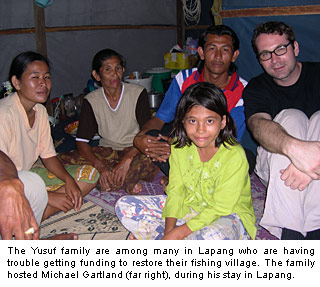It started out as the kind of feel-good story that a newspaper reporter might write dozens of times. Not long after a tsunami devastated southeast Asia in late 2004, Michael Gartland (HSS’96)), a religion reporter at The Post and Courier in Charleston, S.C, received a call from a representative of a local Christian charity that wanted to publicize its campaign to raise money for tsunami relief.

The man told Gartland that his organization hoped to enroll orphaned Indonesian children in Christian schools. Gartland perked up. The Indonesian region devastated by the tsunami is predominantly Muslim, governed by shira law. Gartland questioned the man. Is it right to use this calamity as an opportunity to proselytize?
Suddenly, the focus of the story shifted. Gartland wrote an account of the efforts of Christian organizations to evangelize in areas hit hard by the tsunami.
"We did a little story on it, and I remember there was another story that came out in the Washington Post that was more in-depth," Gartland said. "I wanted to pursue it some more."
Gartland, 31, got his chance this past fall when he traveled to Banda Aceh, Indonesia, as part of a journalism fellowship from the Johns Hopkins University School of Advanced International Studies. From mid-October to mid-November, Gartland toured villages flattened by the tsunami, talking to residents and relief workers, exploring the tensions created by the presence of Christian organizations among a devoutly Muslim population.
"These are people who are living in tents and the American Christians that are coming over are the people paying to put them back in houses, and there is genuine appreciation and they express it," Gartland said. "But at the same time there is discomfort on their part, and when the subject of religion is broached, they become tense."
Much of the rebuilding going on in the disaster-stricken region was being done by religious organizations. Some groups believed that their relief efforts alone should be a testament to their faith, while others, including an organization known as Samaritan’s Purse, had more explicit plans to preach the Gospel to Indonesians, Gartland said.
That was a dangerous prospect. The Indonesian government has outlawed religious proselytizing in order to avoid sectarian violence among adherents of the nation’s five recognized faiths: Islam, Buddhism, Hinduism, Catholicism and Protestantism. The Aceh province in particular has a devoutly Muslim population, and it is has begun to draw Islamic radicals from other parts of the country.
"I met one woman who asked these Christians to leave her village and not come back, because she said they were giving out Bibles. For her, if people in her village thought she was a convert, it’s like social suicide," Gartland said.
Making matters worse is the belief, even among moderate Muslims, that the relief organizations are behind a U.S. government plot to convert them to Christianity. These suspicions were fueled by reports that Samaritan’s Purse has received several million dollars in federal aid and that a high-ranking official of the U.S. Agency of International Development had worked for Samaritan’s Purse for more than a decade. (And who has since left the government to go back to Samaritan’s Purse.)
"Not only are the more radical elements angered about Christians coming over when they (Indonesians) are in this weakened state and trying to convert them, but the fact that the federal government is involved in funding one of these groups has people talking about a conspiracy," Gartland said.
As part of the preparations for his Indonesia trip, Gartland completed a survival training course for journalists at Johns Hopkins. He learned from former British paratroopers how to examine a wounded person, how to dress field wounds, and how to differentiate between high-velocity and low-velocity bullets. The course also included a mock kidnapping.
At one point during his trip, Gartland feared that he might need to make use of his training. One of his interpreters made an unplanned excursion with Gartland. “I asked what they were doing and they said they were kidnapping me,” Gartland said.
It turned out to be a prank. Suffice to say, Gartland was not amused.
"I’d like to go back at some point, but I was happy to come home when I did," he said.



